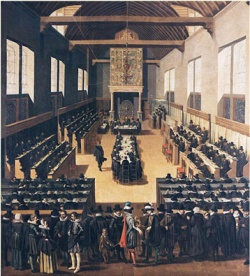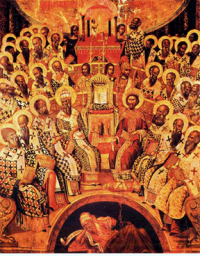 Article 9: Human Responsibility for Rejecting the Gospel
Article 9: Human Responsibility for Rejecting the Gospel
The fact that many who are called through the ministry of the gospel do not come and are not brought to conversion must not be blamed on the gospel, nor on Christ, who is offered through the gospel, nor on God, who calls them through the gospel and even bestows various gifts on them, but on the people themselves who are called. Some in self-assurance do not even entertain the Word of life; others do entertain it but do not take it to heart, and for that reason, after the fleeting joy of a temporary faith, they relapse; others choke the seed of the Word with the thorns of life's cares and with the pleasures of the world and bring forth no fruits. This our Savior teaches in the parable of the sower (Matt. 13).
____________________________________
The authors of the Canons have been perfectly clear from the very beginning that the only reason why any are delivered from God’s wrath stems from something good in God and not because God sees anything good or meritorious in the sinful creature. As we have repeatedly emphasized, the theology of the Canons relates to our contemporary situation in that we cannot begin any discussion of human sin and God’s grace with the presuppositions typical of American democratic egalitarianism, namely, that everyone is equally entitled to a chance at heaven and that it would not be fair for God to elect some or by-pass others because this would mean that God’s decree in election somehow prevents people from receiving that to which they are supposedly entitled, a chance at heaven.
The Scriptures very clearly teach that all of Adam’s children fell into sin when he did (Romans 5:12-19), and they suffered all of the consequences of Adam’s act on their behalf—sin and death. The Scriptures do not teach that everyone has an equal chance to go to heaven. Rather Scripture teaches that the entire human race equally deserves eternal punishment! This means that the entire human race is under God’s curse, since everyone of us have sinned in Adam, and because we have each personally sinned against God’s infinite majesty. God owes sinners nothing but judgment.
Since God does not in any sense owe any of us a “chance” at heaven, before we even talk about why some believe and others do not, we must keep in mind that not one single person ever born deserves to go to heaven, that all alike are dead in sins and trespasses. Therefore, the only reason why any are saved must be sought in the goodness and mercy of God, not in the worth or ability of the sinner.
We have also seen that God ordains the ends as well as the means—that is, God has determined to call his elect to faith in Jesus Christ through the preaching of the gospel. As we saw in article eight, God does indeed sincerely call all those who hear the gospel to faith in Christ without exception. This is the so-called “general call,” or the well-intended free offer of the gospel, which is addressed to all men and women alike. And, as we have seen, it is the divine mandate of the church to proclaim the gospel to all of the nations of the earth.
The Reformed also make a distinction between the “general call,” which is sincerely addressed to all of Adam’s fallen children, and the “effectual call” which is addressed to God’s elect, and which we have seen, is directly connected in the Scriptures to regeneration and the exercise of saving faith. The Canons are clear about this—the only way anyone can come to faith in Jesus Christ is because it has been granted them by the father (John 6:44, 65). All those whom God has chosen from before the foundation of the world will, in fact, be called to faith in Christ when the gospel is proclaimed to them. God will providentially ensure it. Therefore, the reason we must give when we are asked about why some believe and others do not must be located in God’s decree and the power of God unto salvation, which the Scriptures says resides in the gospel, and not in the human will, or natural ability as the Arminians teach.
At this point, the Canons now deal with the question as to why it is that certain people reject the gospel when it is preached to them. The Canons contend that “the fact that many who are called through the ministry of the gospel do not come and are not brought to conversion must not be blamed on the gospel, nor on Christ, who is offered through the gospel, nor on God, who calls them through the gospel and even bestows various gifts on them, but on the people themselves who are called.” In other words, the general call is indeed a sincere call and constitutes a genuine offer of the saving merits of Jesus Christ to everyone who hears the gospel without exception.
There is one gospel and it is to be proclaimed to sinners everywhere. And if sinners do indeed turn from their sins and place their trust in Jesus Christ, God will forgive them and give them eternal life! There will not be anyone in hell who wanted to get to heaven and couldn’t, as though they were among the elect but God would not let them believe! But as we have seen, the fallen children of Adam do not want to place their trust the Savior. Since they are sinful and he is holy, Jesus Christ is repulsive to them. When the gospel is preached, Christ is sincerely offered. The reason why people do not except the Good News is not because the gospel is flawed, but because people are sinful and they are unwilling to believe. Adam’s fallen children would rather perish eternally than bow the knee before the Savior in faith.
We clearly see this set forth in Matthew 23:37-39, when our Lord Jesus laments Israel’s continuing unbelief, even in the presence of the very one sent to save them. Jesus cries out, “O Jerusalem, Jerusalem, the city that kills the prophets and stones those who are sent to it! How often would I have gathered your children together as a hen gathers her brood under her wings, and you would not! See, your house is left to you desolate. For I tell you, you will not see me again, until you say, ‘Blessed is he who comes in the name of the Lord.’” Clearly our Lord did not cry crocodile tears of insincerity over the city, for he plainly attributes their failure to believe directly to the fact that they “were not willing.”
Does the fact that Israel did not believe mean that our Lord’s offer to save them was not sincere or that his gospel was flawed? Or should we simply take Jesus at his word and attribute unbelief to human sinfulness—i.e., the unwillingness to believe connected to the slavery of the will to the sinful human nature and impairment by the darkened understanding. It is clear from John’s Gospel that if anyone does indeed respond to the gospel it because God draws them to faith in Christ. But the fact that God must draw someone does not mean that the gospel is ineffective. Instead, the fact that people do not believe means that because of sin, people are unwilling to believe even though the offer of forgiveness of sin and eternal life be a sincere offer. The problem lies with us, not with God or his gospel.
The Canons go on to elaborate on this a bit further. “Some in self-assurance do not even entertain the Word of life; others do entertain it but do not take it to heart, and for that reason, after the fleeting joy of a temporary faith, they relapse; others choke the seed of the Word with the thorns of life's cares and with the pleasures of the world and bring forth no fruits. This our Savior teaches in the parable of the sower” At this point we would be wise if we took a minute and worked through the parable mentioned here by the authors as a proof-text. In Matthew 13:1 and following we read,
That same day Jesus went out of the house and sat beside the sea. And great crowds gathered about him, so that he got into a boat and sat down. And the whole crowd stood on the beach. And he told them many things in parables, saying: “A sower went out to sow. And as he sowed, some seeds fell along the path, and the birds came and devoured them. Other seeds fell on rocky ground, where they did not have much soil, and immediately they sprang up, since they had no depth of soil, but when the sun rose they were scorched. And since they had no root, they withered away. Other seeds fell among thorns, and the thorns grew up and choked them. Other seeds fell on good soil and produced grain, some a hundredfold, some sixty, some thirty. He who has ears, let him hear.”
Notice that in the parable, Jesus speaks of the seed as the same, the difference in the resulting crop lies in the varying condition of the soils. In verse 10, however, before Jesus begins to explain the meaning of the parable to them, he gives us a very illuminating series of comments about why he is speaking in parables.
Then the disciples came and said to him, “Why do you speak to them in parables?” And he answered them, “To you it has been given to know the secrets of the kingdom of heaven, but to them it has not been given. For to the one who has, more will be given, and he will have an abundance, but from the one who has not, even what he has will be taken away. This is why I speak to them in parables, because seeing they do not see, and hearing they do not hear, nor do they understand. Indeed, in their case the prophecy of Isaiah is fulfilled that says: “‘You will indeed hear but never understand, and you will indeed see but never perceive. For this people's heart has grown dull, and with their ears they can barely hear, and their eyes they have closed, lest they should see with their eyes and hear with their ears and understand with their heart and turn, and I would heal them.’ But blessed are your eyes, for they see, and your ears, for they hear. For truly, I say to you, many prophets and righteous people longed to see what you see, and did not see it, and to hear what you hear, and did not hear it.
Jesus tells the disciples that the knowledge of the kingdom of heaven is not given to all men and women, even though the parable is addressed to all in the sense of a “general call.” Those who gather see, but they do not perceive, or make sense of what they are seeing. Those who have gathered, are said “to hear,” but they do not understand what is being said. The reason for this is not that Jesus’ teaching is ineffective, but because the hearts of the audiences have become calloused and these people have closed their spiritual eyes to the Messiah who stands in very their midst declaring to them the word of life. Otherwise, says Jesus, they just might see and hear and understand, and if they did he would “heal them.”
The problem in hearing and perceiving lies with the audience, however, and not with our Lord’s teaching. They have hardened their hearts and they make no attempt to discern what it is that Jesus is saying. Thus the problem is not with the gospel, but within the human heart. The gospel is sincerely offered to all, and all those who are not of the elect will inevitably reject it, unless God effectually calls his elect through that very same gospel. This is why Jesus speaks in parables. His word brings blessing and curse and while his words are heard with the ear, his meaning is hidden from those who are not his sheep and who do not hear his voice.
Finally, in verse 18 and following, Jesus goes on to explain the meaning of the parable.
“Hear then the parable of the sower: When anyone hears the word of the kingdom and does not understand it, the evil one comes and snatches away what has been sown in his heart. This is what was sown along the path. As for what was sown on rocky ground, this is the one who hears the word and immediately receives it with joy, yet he has no root in himself, but endures for a while, and when tribulation or persecution arises on account of the word, immediately he falls away. As for what was sown among thorns, this is the one who hears the word, but the cares of the world and the deceitfulness of riches choke the word, and it proves unfruitful. As for what was sown on good soil, this is the one who hears the word and understands it. He indeed bears fruit and yields, in one case a hundredfold, in another sixty, and in another thirty.”
Notice, that in every case described here, the seed, the gospel, i.e., the message about the kingdom, is the same. The determining factor as to whether a crop is produced is the varying condition of the soil, which is characteristic of the varying conditions of fallen and sinful human heart. The “good soil,” is the heart made new by the Spirit of God, prepared to receive the gospel, and which does indeed bear a crop much greater than what was sown. On the other hand, the other varying soils do not produce a crop, even though they may for a time, actually demonstrate some small growth and signs of life before withering up and dying.
This, then, is why the authors of the Canons locate the source of unbelief not in a defective or ineffectual gospel, but instead in the wickedness of the human heart. Though the gospel offer of the general call indeed be a sincere one, unless God changes the human heart through the effectual call, people will reject the “Good News” and will not bear true fruit in keeping with repentance.
 Monday, March 9, 2009 at 11:54AM
Monday, March 9, 2009 at 11:54AM 










